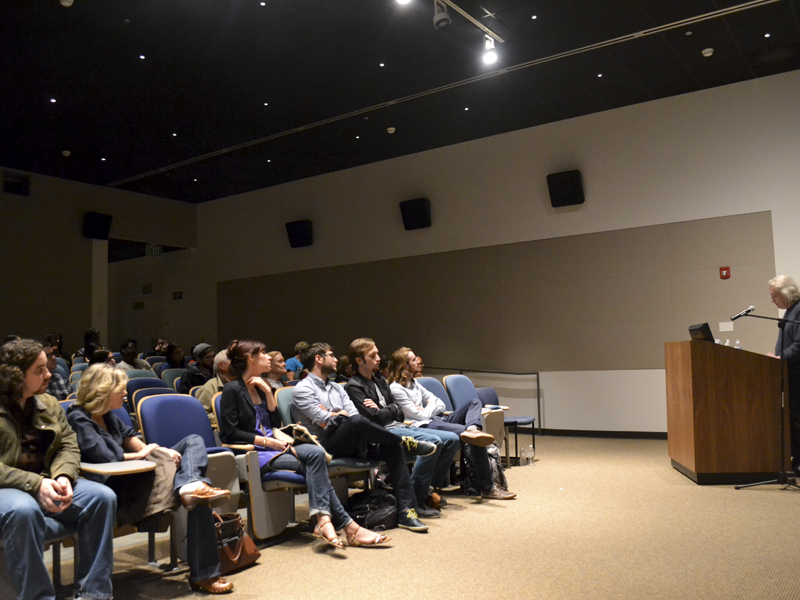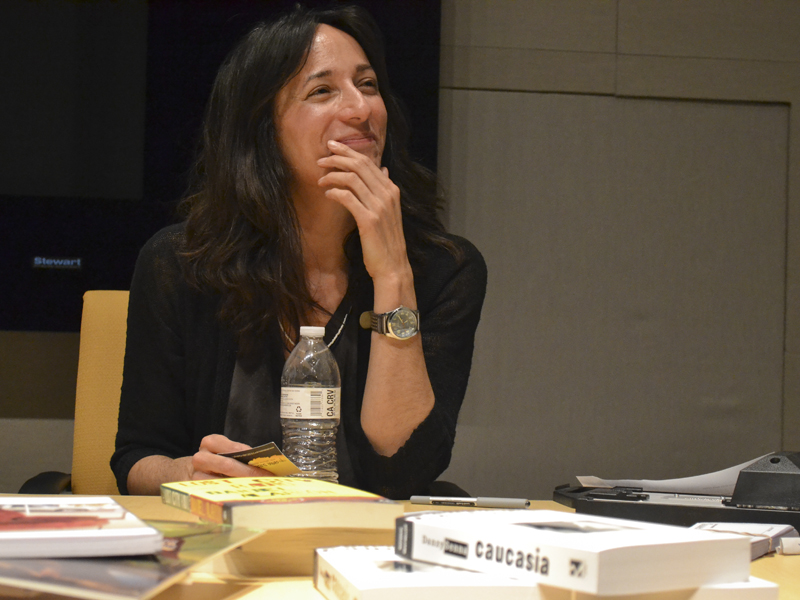
Tuesday, 2-4
Mark Haskell Smith:
UCR’s 37th annual Writers Week opened last Tuesday with a series of readings by writer Mark Haskell Smith. A professor at UCR’s Palm Desert MFA program, Smith’s resume includes his acclaimed nonfiction exploration into the world of Amsterdam’s Cannabis Cup, “Heart of Dankness,” among other works. True to the attention-grabbing nature of the titles of his novels, Smith’s reading was as hilarious as it was animated. The author read to an audience of undergraduate and graduate students as well as professors, detailing a Mormon missionary’s discovery of his bondage kink (from Smith’s novel, “Baked”). While Smith had the audience laughing as he related the minutiae of a missionary’s struggle with the sin of erections, the true treat arrived as he read a selection from his current nonfiction project: “Naked at Lunch.” As a bald, bespectacled and middle-aged man, Smith detailed the leather fetish wear surrounding him in the largest nudist resort in the Mediterranean. His good-natured humor carried into his discussions about the ongoing experience of submerging himself in nudist culture for the book; he laughed alongside the audience at the apparent absurdity of going grocery shopping in a crowded, clothing-optional store, demonstrating his hands-up-sideways-scoot down the aisles in a desperate effort to avoid brushing intimates with other shoppers. Throughout it all, Smith was smiling, enjoying himself alongside the audience entirely — and serving as a solid choice to open southern California’s longest-running free literary event.
Nina Revoyr:
One of UCR’s most anticipated guests at this year’s Writers Week was the Tokyo-born, best-selling novelist, philanthropist and textbook co-editor, Nina Revoyr. Gracious and laid-back, Revoyr announced that UCR was her favorite school to visit and declared that she “tries to tell stories that you’re not used to hearing,” as she introduced the two short story collections she would read from, “Southlands” and “Wingshooters.” The two pieces she read from “Wingshooters” were shocking and beautifully written, but her most horrifically captivating reading erupted from “Southlands,” a scene in which a botched child delivery shatters a young man’s world. Several students were so moved by the passage that they bought the book right there on the spot.
After her readings, there was a heavy silence, which she broke by light-heartedly exclaiming, “I know that was a bit heavy. I really am a happy person!” This loosened up the tense shoulders in the room, and soon questions came pouring in from young aspiring writers, many of whom wanted to know about her writing process. She advised young writers to not be afraid of “the mess of writing,” and to not hurry through projects. She explained that characters and story compelled her, and through them she could deal with broader issues in her work. She also stressed that true victory was crafting the work, not publishing it. “Although it does feel great!” she admitted.
Krys Lee:
Krys Lee, author of the award-winning collection of short stories, “Drifting House,” was one of the most evocative authors to come to UCR this year. She decided to read a lighter story for her late-night audience “since some of my darker stories have actually made people cry,” she explained, almost embarrassedly. She then gave a cool, elegant reading of the story “Goose Father.” This poetically worded story was quite forward, as it dealt with homosexuality and the pressures of culture present in Korea.
Once she finished, she explained to questioning students that “writing had taught me everything.” She described how her writing had allowed her to clarify herself. “The first book is a queer thing,” she mused, “because it is that book that you have to write or you’ll die.” A native Korean, she then stressed that Korea and its culture were very important to her and that she hoped that current generations would be mindful of history and its impact on the present.
A beautiful addition to writers week, Lee’s moving work served as a high note to end the first day on.
ALSO ATTENDING
Nicelle Davis:
Nicelle Davis is the author of the poetry collections “Becoming Judas” and “Circe” as well as the director of the Living Poetry Project, a project devoted to placing poetry anywhere and everywhere to enliven the everyday lives of the passerby. She is also currently the managing editor of the Los Angeles Review and an assistant poetry editor for Connotation Press. On top of all that, Davis has taught at Youth for Positive Change, Homeless Youth Center and Writing in the Schools and is currently teaching at Antelope Valley College. Her next two books, “In the Circus of You” and “The Walled Wife,” are set to be published in 2014 and 2016, respectively.
Kate Gale:
Kate Gale is a prolific and multi-faceted writer, who has already written five books of poetry, six librettos and plans to release two more books in this year alone, titled, “The Goldilocks Zone” and “Echo Light.” Gale also co-founded the Pasadena-centered nonprofit press, Red Hen Press, with her husband in 1994 out of her strong stance on independent publishing. Gale still works for Red Hen Press as managing editor. In addition to that, she is also the editor of the Los Angeles Review and president of the Los Angeles chapter of the American Composers Forum.
Daniel Chacon:
Daniel Chacon is truly a Renaissance man, who has experience and success in the fields of novel-writing, essay-writing, editing, teaching and radio, where he co-hosts the literary talk show “Words on a Wire.” He has reached acclaim with his short fiction collections, “Unending Rooms” and “Chicano Chicanery” as well as his novel, “and the shadows took him.” Other works of his have appeared in several anthologies. Chacon currently is a professor at the University of Texas, El Paso, where he teaches in the bilingual M.F.A. in Creative Writing program.

Wednesday, 2-5
Douglas Kearney:
The second day of Writers Week was opened up by a reading from the renowned poet, Douglas Kearney. Kearney currently teaches poetry at the California Institute of the Arts and has reached success with his two chapbooks, “FEAR, SOME” published in 2006 and “The Black Automaton” published in 2009. His reading was a high-octane performance, making everyone leap in their seats from a bombardment of screams in a multitude of voices, and then lean in as the voices diminished to soft and serious whispers. Each poem was simultaneously a lyrical dissection and verbal butchering of the topics at hand, which included miscarriage, monkeys, masturbation and much more. Kearney was also just as lively in his speaking between the poems, always garnering chuckles with his energetic, yet scathing sardonicism. He introduced his second piece by saying, “I wrote a peppy poem about the Middle Passage because I don’t feel like there are enough of them.” He carried said liveliness into his following Q-and-A, where he discussed his influence from the poet Harryette Mullen, how his performances are different from slam poetry and lastly, how he uses typography and the spacing of his words on the page to enhance his poems. Douglas Kearney set the bar for the rest of the second day and left the stage to an enthusiastic applause.
Daniel Alarcon:
Born in Peru and raised in Alabama, Daniel Alarcon has published four books and is the co-founder of Radio Ambulante, a Spanish podcast. A young, confident man, he read from his new novel, “At Night We Walk in Circles,” describing with stylized detail the events that haunt the protagonist, Nelson, as he tours as a stage actor.
When he finished, Alarcon explained that he wrote his literary works in English, but wrote his radio stories in Spanish with the “freshness of a story you’d tell your friend over a couple of drinks.” Alarcon also shared that his first publication had happened by a stroke of great luck when one of his teachers introduced him to a big-time publisher. “I kind of feel bad telling this story,” Alarcon admitted. “I consider myself to be very fortunate.” When asked how he was able to create such balanced work he replied, “It all comes down to intuition and lots of editing.” He was open about how amazed he was that people read his work — a refreshing thing to hear from a successful author.
Danzy Senna:
Author Danzy Senna read a portion of the short story, “What’s the Matter with Helga and Dave?” from her collection of short fiction, “You Are Free.” The short story centers on the titular couple Helga and Dave, who are both biracial but appear to be of different ethnic identities. According to Senna, the name Helga was derived from a character in Nella Larson’s “Quicksand” and cites Larson as an immense influence on her work. Much of Senna’s literary work delves into the issue of biracial identity and appearance, such as her memoir, “Where Did You Sleep Last Night?” which Senna describes as, “a mix of investigative journalism and the exploring of her relationship with her biracial parents.” In the most significant portions of her Q-and-A, Senna went against the tired phrase “write what you know” by urging writers to instead “write what you don’t know” and then to realize that “the beauty of a (writer’s) work is often in its messiness.”
Steve Erickson:
As the last streaks of orange in the sky faded to purple and then black, the coat-cocooned, coffee-sipping audience nestled deeper in their seats and Steve Erickson took the podium. Erickson, a professor of writing at the California Institute of the Arts and editor of literary journal Black Clock, continued the discussion of race, wrapping listeners up in his deep voice as he threaded together his essay “Six Months that Made the Sixties,” with portions of his newest novel, “These Dreams of You.” Erickson discussed America’s legacy of racial strife and the insidious ways discrimination pervades everyday life — throwaway words, casual comments, how people are presented on television. His lyrical yet frank words painted a portrait of a past America afraid of white teenagers and black teenagers dancing together, and a present America afraid of facing that troubled past. He didn’t know if blending the two different stories would work, but, he said, “If you’re not willing to risk falling every now and then, you probably shouldn’t be a writer.”
Wanda Coleman Tribute:
“A six out of 10.” California Poet Laureate Juan Felipe Herrera jokingly chided the mock-offended group of seven students who had just finished reciting Wanda Coleman’s “Angel Baby Blues.” But reciting isn’t really the right word — the melody reverberating throughout the room was closer to a hymn dedicated to the late poet who had planned to attend writers’ week this year, but passed away before she could make the journey, and who many had called the unofficial poet laureate of Los Angeles.
During the session, students read aloud from some of Coleman’s works, like “The Saturday Afternoon Blues” and “The World Falls Away.” “It’s about the everyday,” creative writing professor Tom Lutz said of Coleman’s work, “and yet the everyday has enormous stakes. And those stakes are the result of people being horrible to other people.”
As the end of the session drew near, Herrera eulogized Coleman as fearless, caring and intelligent, and the words seeped into the somber audience. “So we end this session with new voices,” the poet laureate of California finished, and students stepped forward to sing the last of Coleman’s poems anew in a final farewell to the poet laureate of Los Angeles.

Thursday, 2-6
Ben Stoltzfus:
As the 11 a.m. opener to the final day of Writers Week, UCR professor emeritus of creative writing and comparative literature Ben Stoltzfus was as calm as he was purposeful. Dressed in a tan blazer over a crisp blue button-up, the professor’s measured voice carried throughout his audience of UCR faculty and Riverside residents, detailing the story contained in “The Eye of the Needle” as well as his more recent collection, “Cat O’ Nine Tails.” As a novelist, literary critic and translator, Stoltzfus came across as a man with an eye for detail; he explained the symbolic significance of the cover art of “The Eye of the Needle,” which imposes a swastika over a small image of a rose — indicative of the fascist time period in which the book takes place and the themes of love its characters explore. The latter portion of his presentation involved a reading from his collection of short stories, “Cat O’ Nine Tails” (“It’s about cats,” Stoltzfus half-jokingly explained), wherein the author read passages from a handful of stories — including “Cotton Ball,” which may or may not have been named after Stoltzfus’ cat of the same name — that illustrated his acclaimed and lyrical prose.
Altura Madrid:
A tearful introduction welcomed author and Latino activist Altura Madrid. Recipient of the Charles Frankel Prize in Humanities and founding president of the Tomas Rivera Center, Madrid prefaced his reading with the history of a Hispanic Protestant family in Catholic New Mexico. Hungry for knowledge and needing to write, he broke the norm and stigma of most Hispanics as “illiterate immigrants” when he wrote his family memoir: “In the Country of Empty Crosses.” Madrid’s speech turned into an animated illustration with a breakout of a Texan accent and movements as he read the excerpt about his father going back to Mills, N.M., where the family discussed prejudice and racism. Madrid told students to know their own story, and value it: “Telling your story is the important part.”
Aimee Suzara:
Aimee Suzara, the next reader, tweeted a picture of the crowd as they were the first individuals to hear her newest book: “Souvenirs.” The book of her narratives went from the “live exhibits” of Filipinos in the World’s Fair of 1904 to her family’s migration to America. Revolving around scientific racism, using science to justify racism when using live exhibits of Filipinos in the World’s Fair for people to view, Sazara used her poetry to juxtapose the romantic perception of her migration. She experimented with found text poetry when she read her Congo style poem “My Mother’s Watch.” Throughout the reading, Suzara used “spoken word set”: audience interaction of snaps, reactions and mid-read conversation. Her last reading was done by memorization as she closed her book to recite by memory her poem, “Because Going Home is Not Always Romantic” and received a thunder of snaps from the audience. After her reading, Suzara opened the floor for questions. A student asked if she had advice on retrieving memories when writing their own narratives, Suzara said, “Taking pictures … viewing the stuff that’s filled in, you’ll have your whole story.”
Victoria Chang:
Victoria Chang then took the stage and read several poems out of her latest collection of poems, “The Boss,” which was published in July 2013. Chang has spent most of her professional life in the realm of business and currently works in marketing and communications on top of being a poet. As such, a lot of what she read dealt with the workplace as a setting, and nearly all of them explored the concept of a boss or being a boss in one way or another. “We’re all in many ways in many parts of our lives bosses and underlings in all of our relationships,” said Chang. She may have been soft-spoken, but her words were firm and carried a resonance that left the room in utter and awed silence, prompting one audience member to say, “Are we allowed to clap for each one? Because I really think we should.” In her Q-and-A, Chang discussed her preference to write when inspiration comes, how poetry came to her at an early age and she ended by discussing her stance on the ethics of writing about personal relationships. “If you’re going to do this whole writing thing, I think you have to be honest. And your interpretation of truth is valid. At the end of the day, fear is the worst thing for a writer because it inhibits you from taking risk. If you don’t risk everything, then your work will just sound like everybody else’s.”
Ben Ehrenreich:
Ben Ehrenreich, an author, journalist and correspondent currently based in the West Bank in the Middle East, shared three nonfiction pieces based on the ongoing conflict in Israel and Palestine. The pieces were accounts of different conflict-based events including the killing of 27 Palestinians by Israeli forces in the West Bank and the funeral of a 14-year-old boy who was shot by a bullet fired from a nearby watchtower. Ehrenreich’s decision to work as a correspondent in the West Bank lies in his desire to inform the public about “the pain and suffering going on,” and to “make connections with faces and names and the father and mother grieving that death in a place where so many of the issues are also pertinent here (in the U.S.).” As an author of two novels and with one currently in progress, Ehrenreich believes journalism and novel-writing are intertwined and while the “material you’re given is different, you are ultimately trying to convey certain kinds of truth with both (genres).”
Percival Everett:
Percival Everett, a professor of English at the University of Southern California, was first published in 1983 and, according to an introduction by African Student Programs, has written a book almost every year for the last 30 years since then. Everett read a portion from his novel, “The Water Cure,” a philosophical story of a father who seeks revenge on his daughter’s murderer. Everett accredited seeing miscategorized books in the “African American studies” section of bookstores and the “rampant racism that existed in publishing” as part of the motivation that prompted him to start writing and hold an identity as a “writer of color.” As for publishing a book a year, Everett stated he “doesn’t really get stressed,” and that writing fiction is not about “pleasing everyone,” but writing about “what you want to see on the page.” And such conviction and confidence regarding one’s craft was a perfect ending to UCR’s 37th annual Writers Week.








